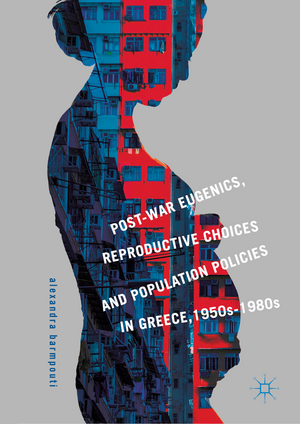Post-War Eugenics, Reproductive Choices and Population Policies in Greece, 1950s–1980s
Autor Alexandra Barmpoutien Limba Engleză Hardback – 21 feb 2019
The book covers for the first time the untold history of contraception in Greece during the 1950s and 1960s when the use of female contraceptives was forbidden. It thus argues that birth control was ideologically based on eugenics. In the same context, the book discusses significant breakthroughs related to eugenics, such as the rise of the feminist movement and the advance of human genetics that took place during this period.
Preț: 467.42 lei
Preț vechi: 549.91 lei
-15% Nou
Puncte Express: 701
Preț estimativ în valută:
89.52€ • 92.23$ • 74.99£
89.52€ • 92.23$ • 74.99£
Carte tipărită la comandă
Livrare economică 24 februarie-10 martie
Preluare comenzi: 021 569.72.76
Specificații
ISBN-13: 9783030035679
ISBN-10: 3030035670
Pagini: 188
Ilustrații: XI, 204 p. 1 illus.
Dimensiuni: 148 x 210 mm
Greutate: 0.41 kg
Ediția:1st ed. 2019
Editura: Springer International Publishing
Colecția Palgrave Macmillan
Locul publicării:Cham, Switzerland
ISBN-10: 3030035670
Pagini: 188
Ilustrații: XI, 204 p. 1 illus.
Dimensiuni: 148 x 210 mm
Greutate: 0.41 kg
Ediția:1st ed. 2019
Editura: Springer International Publishing
Colecția Palgrave Macmillan
Locul publicării:Cham, Switzerland
Cuprins
Chapter 1: Introduction.- Chapter 2: Health and Hygiene, 1900-1950.- Chapter 3: The Hellenic Eugenics Society.- Chapter 4: The International Network.- Chapter 5: Eugenic Concerns.- Chapter 6: Conclusions.- Index.
Notă biografică
Alexandra Barmpouti holds a PhD in the History of Medicine from Oxford Brookes University. Her research interests include the relationship between eugenics and the control of human reproduction and population management.
Textul de pe ultima copertă
This book sheds light on the history of Greek eugenics during the post-war period. At this time, eugenics had already been condemned by international declarations. Alexandra Barmpouti, however, challenges the assumption that eugenics disappeared and confirms the continuity of eugenics after the Second World War. She looks at the Greek paradigm because it included the establishment of a eugenics society in 1953 and revealed the contact of Greek eugenicists with renowned British and American birth control advocates.
The book covers for the first time the untold history of contraception in Greece during the 1950s and 1960s when the use of female contraceptives was forbidden. It thus justifies that birth control was ideologically based on eugenics. In the same context, the book discusses significant breakthroughs related to eugenics, such as the rise of the feminist movement and the advance of human genetics that took place during this period.
Caracteristici
Offers new insights into the eugenics and birth control movement in Greece to show the continuity of eugenics during the post-war period Presents research from previously unexplored Greek, American and British archives Situates the Greek case within an international context, exploring the development of a network of Greek, American and British eugenicists
